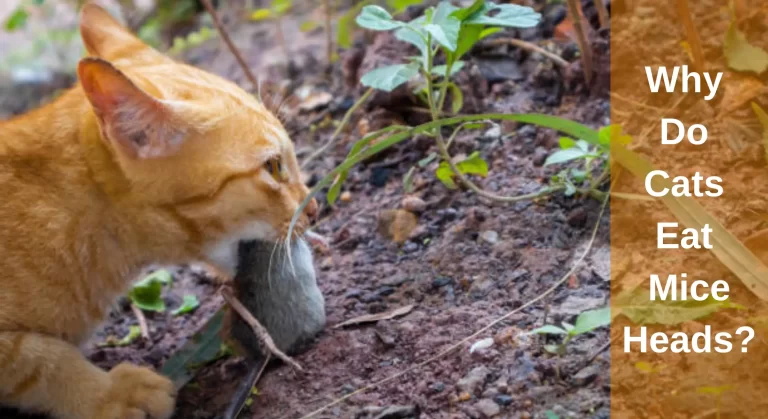Can Cats Eat Lychee? What You Need to Know Before Feeding Your Cat
If you have a cat, you might be curious about whether you can occasionally give your cat snacks. Giving your cats a little additional food provides them relief from their regular diet, but it must be performed responsibly. Fruits and veggies can occasionally be enjoyed like a special delight by cats. If you like lychees, you might be concerned about the safety of letting your cat eat them. “Can Cats Eat Lychee?”
Yes, felines can consume lychee. Most cats like the flavor of this delicious fruit. Lychee is stuffed with vitamins, nutrients, dietary fiber, and fluids, all of which are beneficial for your cats. It’s advised to begin with a little slice of this fruit and observe your cat’s response because giving your cat an excessive amount may irritate its stomach and even causes obesity.
Do you have any doubts about your cat’s desire to eat this strange fruit? If cats can eat, how much of it should you give your cat? Read this article to learn all information regarding lychees and cats. In this brief article, you’ll discover this fruit’s importance, its effects on cats, its health advantages, and the best way to carefully feed it to your feline.
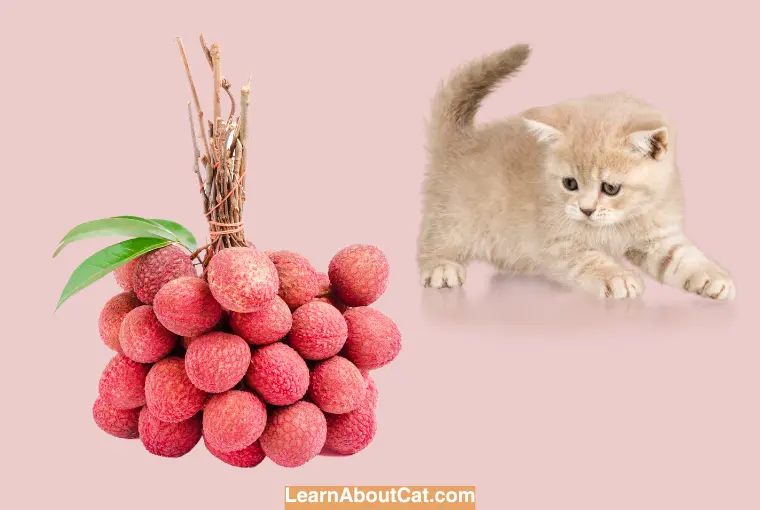
Can Cats Eat Lychee? Is Lychee Safe for Cats?
Yes, Cats can safely consume lychees in controlled amounts. But before feeding them this fruit, make sure all the seedlings are out. This fruit doesn’t include any serious toxins, so you can easily feed your cat these delicious pearls without fretting about any negative side effects.
As far as you wouldn’t overindulge in this delightful candy; one every day is advised for your cat. Otherwise, it can cause gastrointestinal troubles in most cats when consumed in greater quantities.
Lychee also offers wonderful vitamins, nutrients, and antioxidants which will assist them to stay focused both internally and externally.
Check Out: Can Cats Eat Cantaloupe? Benefits And How to Feed
How Lychees Can Benefit Cats?
Lychees are excellent for your feline, you know that! Lychee contains lots of minerals including vitamin C, potassium, and Fiber that are good for your kitty friend. Here, I’ll go through the benefits of lychees for your feline and their nutritional content.
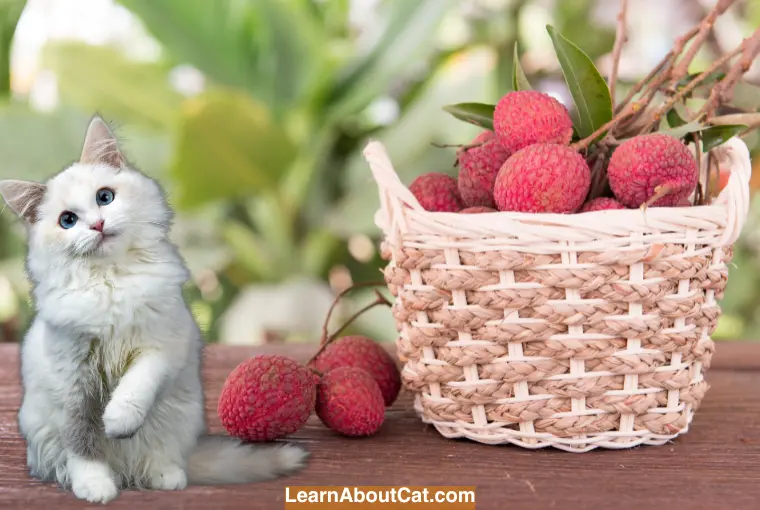
Lots of Vitamins
Vitamins serve an essential part in felines’ bodies and are abundant in fruits. These nutritional supplements are essential for your cat’s development as well as for a healthy, well-balanced diet.
Vitamin C is among the most well-known and significant vitamins. Its abundance in lychee is excellent news. The immunity is strengthened and many bodily processes are aided by vitamin C.
In addition to several other benefits, it also includes vitamin B6 which helps in brain performance, anemia prevention, and muscular regeneration. Most significantly, B6 will produce glucose from protein, fats, and carbs.
B12 is another essential vitamin present in lychee when it comes to the B – complex vitamins. It helps to produce red blood cells, Alzheimer’s protection and reduction in birth abnormalities are all advantages of vitamin B12.
Lychee also includes vitamin D which supports the control of phosphate as well as calcium concentrations in the cats’ body. This vitamin is necessary to keep skeletons, gums, and muscles in good condition.
Lychee is Loaded with Micronutrients
This tiny fruit also includes copper, which helps with the production of red blood cells, the development of collagen, as well as iron digestion. Antioxidant properties of this mineral guard against cell deterioration.
One electrolyte that supports healthy muscular and organ function is potassium. For elderly, ill cats who have depleted salts through vomiting or diarrhoea, this fruit is crucial for them. Furthermore, it is required for both muscle and nerve activity.
Lychee also includes iron which is essential for the cats’ body growth and development. It is employed in the production of vital biomolecules; myoglobin and haemoglobin.
Your cat needs magnesium as a nutritional supplement to function properly. It is necessary for a variety of bodily processes, such as the creation of polypeptides, bone, and collagen, the control of blood glucose and circulation, and the operation of muscles and neurons.
Moreover, lychee is a fantastic calcium provider. It’s beneficial for bone and teeth development. Low calcium concentrations can also make your cat extremely exhausted, which includes having little stamina and feeling lethargic all the time.
Antioxidants
Like other fruits, lychees provide flavonoids that shield the body tissue from damaging free radicals. Free radicals, which are chemicals created by oxidation, can harm cells. Antioxidants can thus prevent or reduce the damage caused by free radicals.
Free radical species are created by regular metabolic activities, including physical activity or damage. They are found in our nutrition and the surroundings, including contamination or pollutants.
Free radical destruction with time may result in damage or malignant cells. So, these antioxidants strengthen the immunity of the body.
Large Water Content
Spasms, migraines, and irritable stomachs may be brought on by dehydration. Moreover, medical problems like chronic renal failure, hyperglycemia, bowel inflammation, and hyperthyroidism can all lead to dehydration in cats.
So, lychees are an excellent substitute for cats that are facing dehydration or any of the above-mentioned medical issues.
A cat’s body mass can be close to 70% water; therefore, it might be challenging to determine if your cat is parched. Thus, lychee will serve as a sufficient water source and keeps your cat hydrated at all times.
Check Out: How to Get Your Cat to Drink More Water
High Fiber Content
Lychees have a significant amount of fiber. 53 grams of fiber are thought to be present in 25 grams of lychees. Cats require at least 38 grams of fiber daily for good gut health.
For carnivores in particular, fiber is a wonderful resource of prebiotics. The gallbladder is similarly stimulated by fiber. So, you can offer lychee to your furry friend for their digestive system health.
Potential Dangers of Lychees for Cats
Even if cats may enjoy lychee fruit because it provides several benefits, you still aren’t in a safe place. Lychee contains a high-calorie count than is required, compared to the daily caloric needs of cats. This may have negative health effects and promote overweight in your cat.
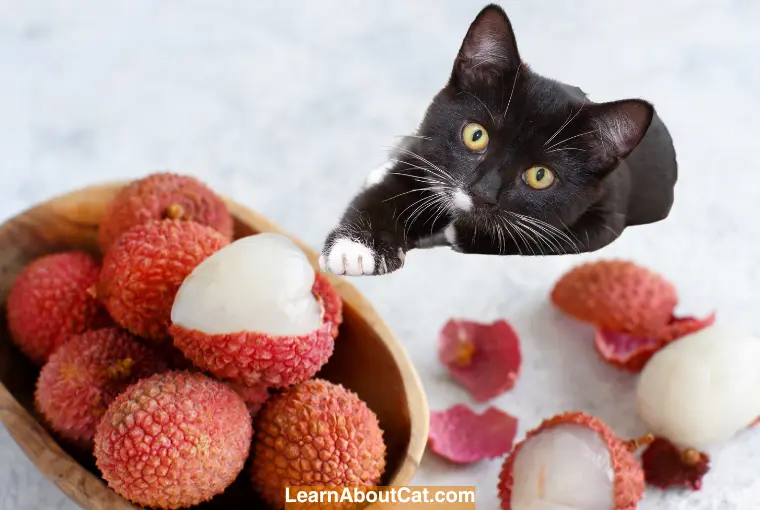
Lychee is high in sugar which makes us crave it. But such an intake of sugar can harm your cat and may cause diabetes. This scaly fruit contains a lot of carbohydrates that cats can’t tolerate.
Also, lychees contain citric acid, which may be harmful to cats if they consume them. The health of your cat is still at risk even though it is only present in little amounts.
While little portions of lychee fruit are entirely safe for your cat, you must be cautious about the seeds, stems, and shells. You should make sure that all chemicals are removed by washing them. Store-bought lychee should be cleaned because the skin contains a lot of hazardous substances.
Lychee skin is uninviting because of its rough, crusty nature. In addition, if your cat ever thinks to swallow it, she might suffocate on the shell. For the protection of your feline and your mind, protect your feline from the seeds and shell of lychees.
Lychees may induce skin reactions similar to certain other food intolerances, like atopy, in cats. Other signs of lychee allergies in cats include anaemia, gum soreness, drowsiness or reduced activity, and bloody diarrhoea.
Also Read: Can Cats Eat Oysters?
Preparing Lychee for Your Cat
There aren’t any extra preparations necessary other than peeling the shell and deseeding it before giving it to your feline. Lychee deseeding and peeling, however, may be a frustrating process.
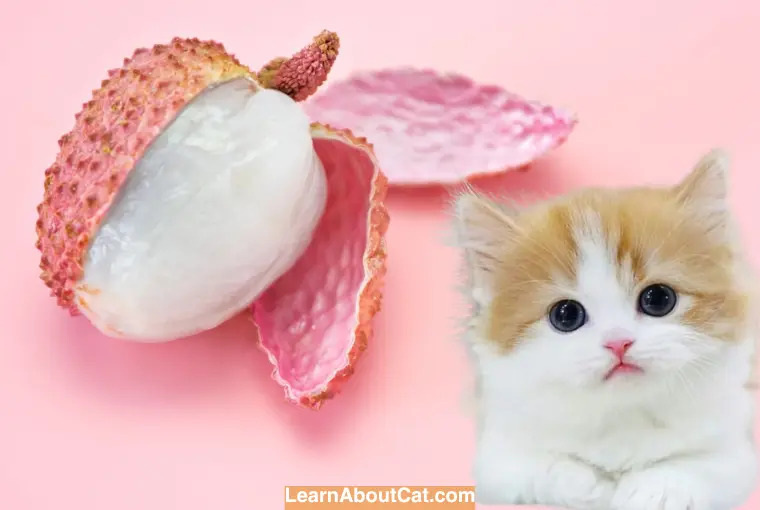
Lychee must be peeled outside so that the fruit’s liquids can easily drop to the floor while you’re preparing it. Alternatively, you may use a big chopping board or deal with lychee on the basin.
The peel and seed can be removed more easily if you slice it in two parts with a knife. Few markets and occasionally neighbourhood food stores sell canned and frozen lychee which has been peeled and sliced.
But, if you choose to buy cooked lychees, be careful they don’t include any extra sugar or other additives that aren’t essential for your cat’s wellness. Preservatives and excess calories have the potential to cause issues including gaining weight and the onset of diabetes.
You should prepare a lot of lychees simultaneously and then freeze them. So, while the time of serving you can just break a tiny portion of lychee any time you want and give it to your cat as a snack because doing this will preserve the fruit’s freshness for weeks.
The real kicker is that lychees can be eaten by cats both raw and cooked. However, you must avoid raw lychees as it contains some poisons that can make your cat throw up if you eat a lot of them.
The raw lychee pulp should rest in freshwater to hydrate after being diced up. The freshness and proportions of your lychees will determine how much water you need.
You might just need to dip your lychees in freshwater for a short period if they are green and little. However, if they’re older soak them for longer. You can cut or chop your lychees after they have been rehydrated and serve them in moderate amounts to your cat.
Intresting Reading: Can Cats Eat Goji Berries?
How Do I Give My Cat Lychee?
If your feline is new to lychees you might be thinking how would I give my cat lychees? The answer is that you’re not required to. Due to their inherent curiosity, cats are probably interested in tasting this new fruit by themselves.
Furthermore, if you’re still unsure of your decision to feed lychees to your feline, offer them a bottled lychee substitute. The majority of cats enjoy this item, making it an excellent method to expose them to the flavour of this delectable fruit.
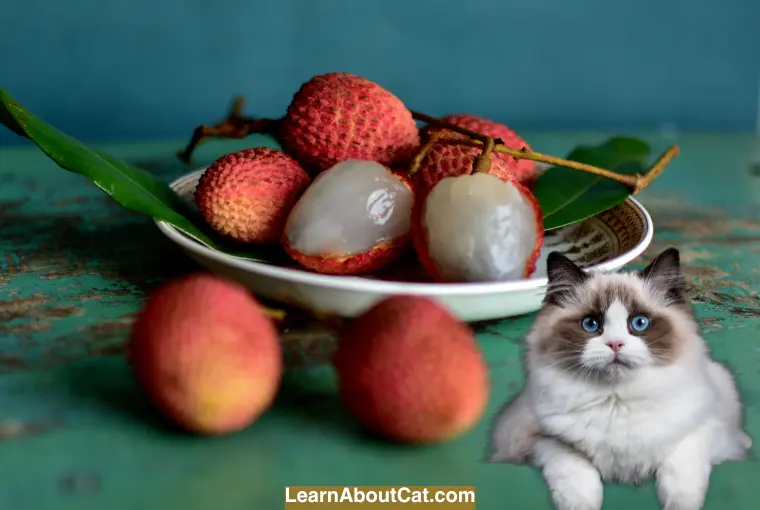
Salmon and Lychee Salad
In addition to being healthy for humans, this tasty fish is also a cat favourite. Salmon is a fantastic way to obtain protein and fatty acids known as omega-3, and both are essential to the well-being of your cat.
Just combine tinned salmon and lychee (with the nectar removed) to create this salad. If you want to smooth this out, you may add a touch of water. Offer this salad as a snack or as a substitute for a meal.
Tuna and Lychee Delight
Another fish that felines enjoy is tuna. It’s also a fantastic option for protein and omega-3 oils, both of which are crucial for the well-being of your cat.
Just combine packaged tuna and lychee without the sugary syrup to create this delight and for making it smooth add a little bit of water.
Lychee and Chicken Treat
Chicken is a fantastic protein source and also contains other key components that are essential for the fitness of your cat.
Just combine boiled chicken and lychee that has had the syrup removed to create this delicious dish.
Lychee and Shrimp
Shrimp is an excellent resource for nutrition as well as other minerals that are crucial to the well-being of your cat. Combine lychee with fried shrimp to make delicious scampi.
Cod Fish Cakes with Lychee
The calcium and other minerals found in cod fish are excellent for your cat’s health. Just combine grilled cod fish and lychee to make homemade delicious cat cakes.
Cooked lychee
For cooking the lychee, you have to get a ripe fruit, remove its shell, and take the seeds out. The fruit should then be boiled or steam-cooked over medium heat without the addition of any seasoning, flavours, or fats.
How Often Can I Give My Cat Lychee?
Feeding lychee to your feline safely requires balance. Feeding lychee to your cat in moderate amounts, such as 1 or 2 times a week and or a few slices of this ripped fruit’s flesh once or twice a week.
When you feed your feline lychee keep an eye on him for any symptoms of diarrhoea or vomiting afterwards. Stop providing lychee to your cat if he immediately becomes sick after eating it.
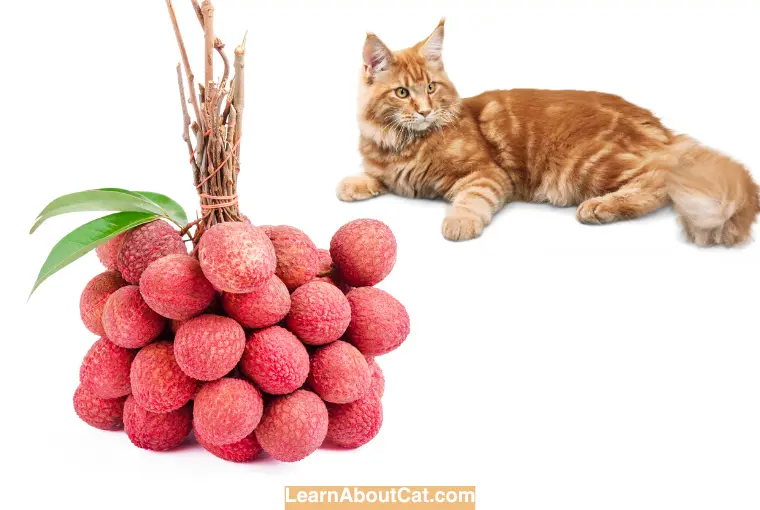
How Many Lychees Can I Give My Cat?
As a standard guide, begin with a modest quantity and observe your cat’s response. You can progressively raise the quantity you feed your cats if they appear to be loving it and are easily digesting it.
I would recommend beginning with 1 lychee a week for a little cat and 2-3 lychees for a big cat. Moreover, the age, weight, and general health of the cat are the important factors that also matter.
Cats who are older or who are sickly require more energy than kittens. Overweight cats experience the same thing. To replenish their bodies with nutrition, they will need extra calories.
Larger-breed cats shouldn’t allow consuming lychee, and neither should cat with medical conditions. Lychee consumption in overabundance can cause diabetes, renal failure, urinary blockage, and other issues.
On the other hand, eating lychees in bulk could seriously threaten your cat’s health. If the lychees you give your cat are overly sweet, you could overdose. Vomiting, diarrhoea, and nausea may be symptoms.
Also, Check Out: Can Cats Eat Cranberries?
Can I Give My Cat Canned Lychee?
No, you shouldn’t give your cat tinned lychee since it may include extra flavour components such as sugary syrup that are bad for cats. The syrup has a significant sugar content, which is bad for your cat’s well-being.
The ideal option when trying to give your feline lychee is to give it just freshly harvested fruit that has been pitted and peeled.
Find Out: Can Cats Eat Human Food? List of Human Foods That Cats Can and Cannot Eat
Frequently Asked Questions
Can kittens eat lychee?
Kitties shouldn’t eat lychee since it can damage their well-being and lead to stomach issues. Lychee is very sweet and acidic, which might irritate a kitten’s immature intestines and cause vomiting, diarrhea, and other gastrointestinal issues.
Can cats eat lychee jelly?
No, cats can’t consume lychee jelly because it is heavy in sugar and it can lead to obesity, hyperglycemia, and a range of other body fat concerns. Moreover, the sugar substitutes used to make jelly are bad for your cat.
Are lychee seeds poisonous?
Lychee seeds contain toxic substances that are highly poisonous. So, when accidentally consumed they will cause hypoglycemia or unconscious due to a reduction in blood sugar concentration to dangerous levels. Moreover, seeds of lychee also cause the risk of choking.
Can pregnant cats eat lychee?
Lychee and other human foods should not be given to pregnant felines. The dietary demands of expected cats vary as compared to non-pregnant felines due to their unique nutritional requirements. It is recommended to give your pregnant cats a significant commercial cat meal that is specially prepared according to their requirements.
What fruits are toxic to cats?
While most fruits appear to be healthy for our furry friends to consume, many are seriously toxic. Cherry, citrus fruits, grapes, lemons, and limes are a few examples of this type of fruit.
Conclusion
We truly believe that our explanation of this query helps you to make the best decision. Lychee can be a wonderful supplement to your cat’s diet if you give it a little bit occasionally. It is a good source of vitamins, mineral deposits, and other beneficial nutrients like dietary fiber.
Each of these nutrients is vital for your cat’s health. The shell and seeds should be avoided at all costs because they are highly dangerous to felines. Don’t serve your feline unripe lychees because they’re toxic. However, you can safely feed 2-3 ripped lychees per week to your cat as a sweet treat.
Make sure the reward you give your cat will be enjoyable and won’t hurt them before you give it to them. Moreover, a cat’s intestines can be delicate, so must consult with a specialist before introducing any unfamiliar treats to your feline to determine whether they would be beneficial for her health.
Related Posts:
Who is Isabella?
My name is Isabella, and I am a dedicated and knowledgeable cat enthusiast. With years of experience caring for cats and a deep love for felines, I made a mission to help other cat lovers navigate the challenges of cat ownership.






